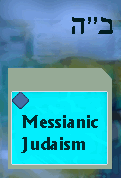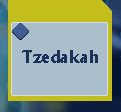
Tzedakah — Righteous Giving
One can give without loving, but it is impossible to love without giving! God loved us so much that He gave His one and only Son to die - that we might live. The love of God is beautiful, gracious, holy and merciful. Love that went to such awesome, terrible and heartbreaking depths to redeem us from our sins must cause an appropriate response from our hearts. If we are truly to become like Yeshua then we will want to be people who love, and thereby be people who give.
Yochanan records Yeshua’s answer to the Jewish people who claimed that Avraham was their father. He said to them, “If you are Avraham's children, do the deeds of Avraham.” The principle of faith without works being useless is at work here, for Avraham who offered up Yitzchak, his son, on the altar, began by giving his tithes to God. Avraham had a loving heart and his deeds reflected that heart. But in order to give the ultimate gift to God, his son, he needed to trust God in the smaller mundane things.
In the time of the Mishkan, the Tabernacle, and later of the Temple in Yerushalayim, there were three words associated with giving. The Hebrew word “terumah” meaning “offering” or “portion,” was used only in conjunction with giving to the Lord, meaning that this “portion” was to be set aside for a higher purpose, such as the building of the Mishkan. Second Hebrew word for giving was “ma’aser,” translated as tithe. After the building of the Mishkan tithing became a mandatory giving for the maintenance of the Mishkan, for the priests and the Levites in addition to the terumah, the offering for the Lord. The third Hebrew word for giving is “tzedakah.” Tzedakah was associated with the giving to, or the good deeds towards, the widows, the fatherless and the poor.
The apostle Shaul teaches that faith works through love. If we love Yeshua, then our faith will perform its work, we will enter into God's good works prepared for us beforehand (Ephesians 2:10). But, as with Avraham, one needs to go first through a learning process before the faith is strong enough for the bigger things, and that is the reason God has taught us to give continually. Our faith must be tested. The Hebrew word “tzedakah” also means “righteousness” which implies that our righteousness is tested in our giving. Do we put our trust in God, or do we put our trust in money? Is God the secure Rock of our lives or is our bank account our security in life? In 2 Corinthians chapter 8, the apostle Shaul uses the example of the assemblies of Macedonia to teach us this principle. These believers, though going through a “great ordeal of affliction,” had an even greater joy in knowing Messiah, that, even in deep poverty, they gave liberally to support the spreading of the good news: “For I testify that according to their ability, and beyond their ability they gave of their own accord, begging us with much entreaty for the favor of participation in the support of the saints.”
As beautiful as this example may be, can it be applied to our modern life? What are we to give and how much, now that the Temple in Yerushalayim has been destroyed and the offerings and the tithes are no longer applicable to our lives? Are we still supposed to support the people who teach us and labor for our spiritual edification and uplifting as the priests of old? the various ministries for the edification of other people? the maintaining of our place of worship? and the widows, the fatherless and the poor? Yes on all counts.
But should we be giving to God when we need new clothes for our children, or when we have unpaid bills, or when we need to pay tuition, rent, buy food or take care that we have enough saved up for our future? This is exactly the challenge to our faith. Yes, we need to take care of our needs, but when we give from our excess and are still assured that we can afford all the things we desire in life, how is our faith challenged? If we cannot trust God to take care of us in this life and provide for our needs, then how can we have faith that He will save us and grant us entrance into His eternal Kingdom? Yeshua's words must resonate in our hearts: "If you are not faithful with earthly riches, who will entrust you with true wealth?"
The Macedonians were poor, very poor, it is described in the Scripture as deep poverty, yet they gave beyond their ability and considered it a favor to them. Their faith was working! Their trust was in their Savior because they first gave themselves to Him and their hearts were responding to His love. Yes indeed, the New Covenant giving is a matter of love.
|


 Is Messianic Judaism Biblical Judaism?
Is Messianic Judaism Biblical Judaism?  What is the Jewish Calendar?
What is the Jewish Calendar? The Jewish Holy Days are the seven God's Holy Days.
The Jewish Holy Days are the seven God's Holy Days. The Shabbat is the seventh day which God sanctified and set apart for worship.
The Shabbat is the seventh day which God sanctified and set apart for worship. Tzedakah, the righteous giving.
Tzedakah, the righteous giving.